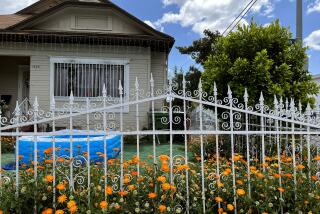Doggone Right You Need a Good Fence
- Share via
Question: We are hoping to buy a bulldog now that we’ve been watching the TV series “Jake and the Fatman,” which features the dog, Max. We have a small yard, but it isn’t fenced, so we’re shopping around now for the proper fencing that will be aesthetically pleasing and still be sturdy enough to keep a dog from getting out. We have a ranch-style house in the San Fernando Valley.
Answer: When it comes to confining a dog safely, I let aesthetics go out the window. The dog’s safety is the most important thing. And short of a concrete wall, the surest way I know to fence in any dog is using chain link in a concrete footing. Height of the fence is not so critical with a bulldog, because they aren’t mad about climbing or jumping. But it’s a very unimaginative dog that doesn’t at one time or another think of getting out to see the world. And bulldogs, while lovable and funny, are stubborn and unrelenting, as you no doubt know.
Without the concrete footing, a bulldog can dig his way under the fence. And while it’s not a common practice with bulldogs as it is with some other breeds, chewing wood is just a means of passing the time.
If I were you, I’d go for the chain link, and plant vines to cover it in certain areas. I always feel that dogs like to see out, just as humans do, so leave uncovered areas to let your “Max” have a view to the outside world.
Q: When it rains and the wind blows, as it did about a month ago, water got in under our garage door. This wouldn’t be so bad if we used the garage for the car, but actually we use it only for a storage area. Several boxes were soaked at the bottom during the last rain, and fortunately I caught the problem in time to save the contents. What can I do to keep the water out?
A: If you’re certain water gets in only when it’s a blowing rain, then probably all you need is a gasket on the bottom of the garage door. That is, a plastic or rubber strip that spreads against the floor when the garage door is closed. You can buy gaskets in the length you want at home centers or lumberyards.
Should you find water getting in under the door at other times, you may have a drainage problem, which will require a lot more effort and money.
Q: I had an electrician come in to give me an estimate for installing some outdoor lighting near my patio and garage. He wants to put it on a separate circuit from the rest of the house, and of course, he says this will cost more money. Is that necessary or is he just selling me a bill of goods?
A: He sounds as if he’s concerned for your safety, and he probably knows what’s required by building & safety regulations. I don’t off-hand know what the building codes require, but it is certainly a good idea to have the outdoor lights on a separate circuit. That way you can turn off the current to the outdoors before you change a bulb or make any adjustments to the outdoor fixtures--and your indoor lighting won’t be affected by the off time. Damp ground from plant watering, water splashes from a swimming pool (if you have one) and other sources of moisture you might not be aware of, can be a serious hazard around outdoor lighting.
A ground fault interrupter is probably required by law. It will automatically shut off all power in case of a problem. I’d get into the building & safety department to get first-hand information before installing any outdoor lighting.
More to Read
The complete guide to home viewing
Get Screen Gab for everything about the TV shows and streaming movies everyone’s talking about.
You may occasionally receive promotional content from the Los Angeles Times.




